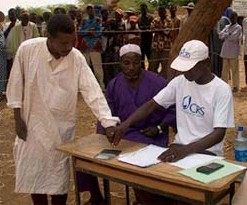
Contact: Hilary Roxe, Communications Officer, Catholic Relief Services (CRS), 410-951-7408
MEDIA ADVISORY, Mar. 1 /Standard Newswire/ -- Eighteen months ago, in July and August 2005, the situation in
Photo: A CRS employee registers beneficiaries for a free food distribution in Zinder during the 2005 food crisis, photo by CRS Staff.
Conscientious citizens of the world are now wondering if the situation in
Has the situation in
Yes, according to the Government of Niger’s Ministry of Agriculture, this year’s cereal harvest produced 3.97 million tons, enough to meet national consumption requirements, compared to a 505,000 ton deficit in 2005. Cereals are widely available for purchase in local markets at stable prices.
Are the children of
Yes, but the preliminary results of an assessment, conducted in December 2006 by the Government of Niger, UNICEF, WFP, and Helen Keller International, reveal that the rate of global acute malnutrition (weight for height) dropped from 15.3 percent in 2005 to 10.3 percent in 2006. This success represents the diligent efforts to improve child nutrition on behalf of the Government of Niger, humanitarian agencies, communities, and caregivers.
Does the situation in
Yes. Although this year’s harvest was better than those of year’s past, pockets of
How has CRS helped and what are they doing now?
CRS has been responding to food insecurity in
In 2006 and up to present, CRS and local partners continued to support Nigerien families as they recovered from the previous year’s shocks through the following interventions;
- Conducting rainy and garden-season Seed Vouchers and Fairs that permit 21,500 farmers access to seeds and tools;
- Facilitating Agro-enterprise trainings that provide 900 cash crop agriculturalists with a better understanding of marketing their produce;
- Constructing 185 garden wells through Cash-for-Work, permitting at least 740 farmers to participate in off-season vegetable production;
- Construction of 24 fodder (for livestock) banks to benefit 2,400 pastoralist families;
- Facilitating Food-for-Work and Cash-for-Work activities that enable 208,030 vulnerable families to earn an income while engaging in community building projects;
- Administering vitamin A, an essential micronutrient proven to reduce child mortality, to 6,000 pastoralist children;
- Supporting the operation of 33 nutritional rehabilitation centers and treatment of over 25,700 malnourished children;
- Distributing essential non-food items such as blankets and kitchen kits to 791 families affected by floods in July and August
- Sensitizing health workers and 236 communities on the Avian Flu virus
In 2007, CRS will continue to assist vulnerable Nigerien households affected by crisis. In late February, CRS and partner Caritas Development Niger will distribute tents to 675 homeless families in Bilma who are suffering through cold temperatures after the past rainy season floods.




 Sign Up to Receive Press Releases:
Sign Up to Receive Press Releases: